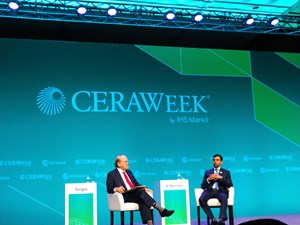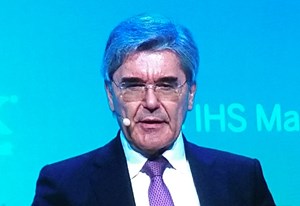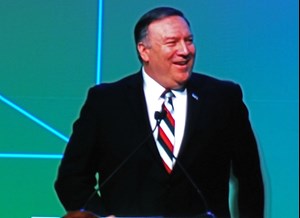CERA Week 2019 Day 2 - Leadership
During Day 2 of CERAWeek 2019, the leadership dialogue continued with Chevron Chairman of the Board and CEO Mike Wirth, who spoke to the crowd about Chevron’s goals in the Permian basin and Gulf of Mexico.
The super-major touts remote geosteering as a key to drilling in the Permian. “Reserves in the Permian basin are much larger than previously thought. We can drill much longer laterals, using machine learnings,” said Wirth. With all the excitement in West Texas, Wirth reassured audience members about Chevron’s commitment to offshore exploration. “We have not given up in the Gulf of Mexico.”
In addition, Wirth reminded attendees that concern for energy and the environment has been a part of Chevron’s history since replacing whale oil as a fuel source. Finally, Wirth explained the company’s support of women in leadership roles at Chevron. “We are committed to changing the culture, to change the environment, where women can be successful.”
Diversification. As Middle Eastern companies seek new funding and continue to invest worldwide, H.E. Eng. Suhail Mohamed Faraj Al Mazrouei, UAE Minister of Energy & Industry, engaged in a dialogue about “complementing one another” and remained focused on collaborating across the industry to share best practices. In addition, Al Mazrouei expressed an increased interest in consuming and producing “easier shale.” This can only be done with the input of those that have already successfully drilled shale.
In the workforce, UAE state firm ADNOC believes that women should be afforded opportunities to succeed in the industry. “We need them. They are capable,” stated CEO Sultan Ahmed Al Jaber. However, he went on to say that they do not carve out special assignments for women, but instead, the company is committed to giving them a chance to thrive.
Transformation. Petrobras CEO Roberto Castello Branco shared his vision of a transformational, stronger and efficient company with aspirations to be “one of the best.” To reach these goals, the Brazilian company is making major infrastructure changes, in hopes of lowering costs and reinvesting capital.
In addition, Branco maintains that the company plans to preserve safety, and its high standards of compliance, to reduce corruption. However, he does admit that Petrobras is behind in the digital transformation sphere. “It’s a priority to implement digital transformation,” he said. “We will cut costs, but we will invest in digital transformation.”
Globalization. During lunch, Siemens AG President and CEO Joe Kaeser discussed supply-chain globalization in the industry. “Localization is key to globalization,” he said. “The future world is going to be without boundaries,” he continued, explaining how the Internet of things has launched the 4th revolution. “The world is borderless, with a free flow of data."
As a technology company, it is beneficial to look past short-term advances and take a wider world view, he noted. Kaeser read off a short list of challenges that society faces today, and how these challenges may impact the future:
- Populism rise
- Climate change
- Global migration
- Forced industrial revolution
- Focus on the short term
Innovation Agora. CERAWeek features a special section of the conference for learning and exchanging ideas. According to the website, the agora is an open marketplace for energy innovation, emerging technologies and solutions. Included in the presentations are products such as Omnirise by FSubsea. This is a family of subsea centrifugal and positive displacement pumps that does not require any external barrier-fluid supply, and all have the possibility of integrated variable speed functionality.
Global upstream. In this session, Al Cook, executive V.P., global strategy and business development, Equinor; Daniel Gonzalez, CEO, YPF; Gretchen Watkins, president, Shell Oil Company and executive V.P., Shell Upstream Unconventionals; and Matt Fox, executive V.P. and COO, ConocoPhillips, discussed the decline in supply, need for sustainability and the reduction of carbon emissions.
Cook shared his vision for managing uncertainty versus certainty, including politics, oil prices, and social pressures. He stated that by implementing digital technology, Equinor will be able to reduce costs and retain value. “We need to prepare for a revolution by investing in new fuels,” he added.
Gonzalez reiterated YPF’s success in the Vaca Muerta formation. It began as “a vision and has become a reality,” he proudly stated. He also believes that investing in AI will help the company progress into the future.
Watkins reassured the audience that Shell will continue to focus on methane emissions and forcefully stated that “the U.S. should not strip the regulation of methane emissions.”
Fox discussed ConocoPhillips’ strategy to allocate capital to existing projects, manage uncertainty, and be resilient during the downside.
North American shale disruption. In this panel, Fox of ConocoPhillips, along with Mark Gunnin president, Hunt Oil Company; Doug Suttles, president and CEO, Encana; and Lee Tillman, president and CEO Marathon Oil Corporation, discussed the U.S. role in catapulting the shale revolution.
Gunnin shared his view from Hunt’s private company perspective. By combining horizontal drilling and fracing in a new way, the company is encouraged to take risks and empower people to experiment with new ideas. Suttles offered advice to companies, as profits begin to roll in. “We need discipline in investing,” the Encana CEO said. There are some, who may want to pay investors, and there are some who may want to reinvest it all in new projects. The trick is to be conservative, even in good times.
Tillman discussed the ingredients for success at Marathon. “It all comes down to differentiated competition. That comes down to people, and “great rock.”
Venezuela. Ambassador Carlos Vecchio, Venezuela’s ambassador to the U.S., and Ricardo Hausmann, director of Harvard’s Center for International Development, Harvard Kennedy School, and professor of the practice of economic development, spoke about the plight of the Venezuelan government and a need for investors. “Venezuelans are ready for a change. Help us to rebuild Venezuela,” Vecchio pleaded, followed by thunderous applause.
In addition, Luisa Palacios, chairwoman, CITGO Petroleum Corporation; Maynard Holt, CEO, Tudor, Pickering, Holt and Co.; and Ashok Belani, executive V.P. of technology, Schlumberger Limited, continued to discuss what needs to be done in Venezuela before investments will begin. “CITGO is the first part of this process,” said Palacios. “I am very positive,” she went on to say about the outlook of Venezuela, its people, and the oil and gas industry.
U.S. stance on the industry. U.S. Secretary of State Mike Pompeo, spoke to a standing room-only audience at the conclusion of CERAWeek Day 2. He discussed the positive effect of the oil and gas industry on the U.S. and proudly encouraged others to follow suit. “The industry is doing a game-changer now, and it took shale producers and the removal of the export ban,” to elevate shale to where we are today. He went on to say that it is more than just the industry exports—“we are exporting our commercial value system, not just oil.” He went on to invite other oil companies to “come follow America’s footprint. Our model is superior.”
In addition, Pompeo spoke of the Middle East Strategic Alliance (MESA) and its goal to work together on national security issues. He also encouraged other countries to align with the U.S. “The most strategic countries have a deep relationship with the U.S.A. I don’t think anyone should bet against the U.S.A” he concluded.





